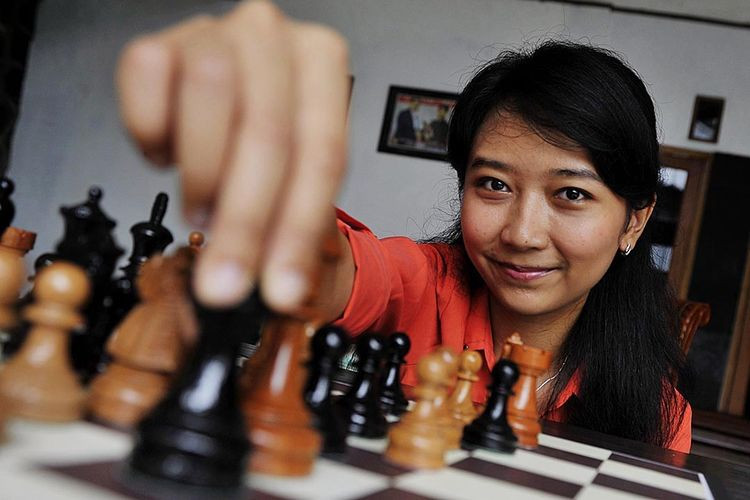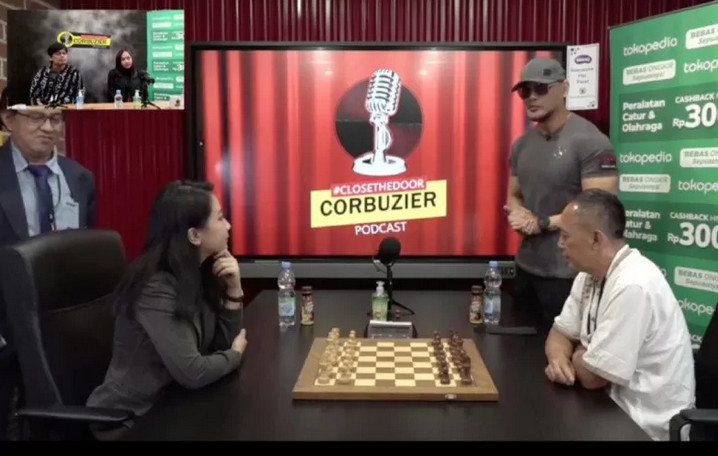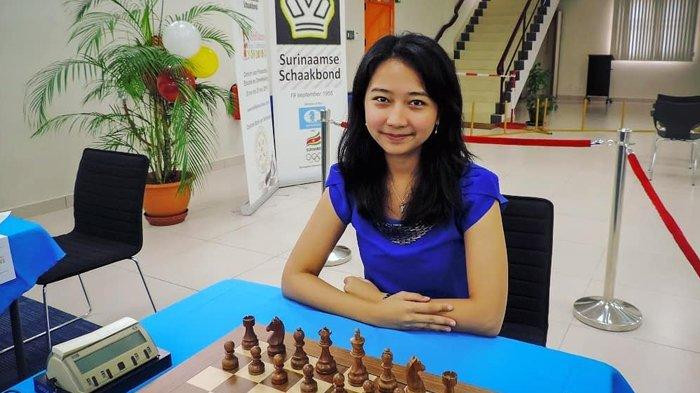Popular Reads
Top Results
Can't find what you're looking for?
View all search resultsPopular Reads
Top Results
Can't find what you're looking for?
View all search resultsMeet Irene Kharisma Sukandar, the grandmaster thrust into the spotlight
Indonesia’s most viral chess match pitted an international grandmaster (IGM) against a retired bird feed salesman. But there is more to the story. It was also a clash of the two competing cultures in Indonesian chess, exemplified by the match’s challenger, IGM Irene Kharisma Sukandar.
Change text size
Gift Premium Articles
to Anyone
I
rene Kharisma Sukandar is eviscerating her opponent with brutal precision. She looks on at the chessboard with characteristic calm. On occasion, she buries her forehead in the palm of her hand, betraying not a hint emotion.
But there was no chance. Her opponent had made mistake after mistake and she had pounced each time. The match that started as a scandalous yet puzzling chess feud had ended with an international grandmaster defeating a retired salesman.
Naturally, there was more to this story.
Despite its lofty reputation abroad as a game of intellect, chess had never taken off as a professional sport in Indonesia. Skillful players such as Utut Ardianto and Susanto Megaranto emerged from time to time, but scant funding and lack of public interest meant Indonesian chess had never truly threatened the world’s elite.
That’s not to say chess, in itself, was not popular. Walk into any pos ronda (security guard outpost) in any neighborhood in Indonesia and there’s a good chance you will find a chessboard, most likely with lingering coffee and cigarette stains.
A legacy of the New Order era, the pos ronda is an ubiquitous presence in Indonesian cities. Members of the community are often roped in to serve as makeshift security guards, serving alongside professional security guards to protect their neighborhood. Whiling the night away meant there was a need for entertainment, and chess met this need.
Ask any Indonesian person about chess, and what comes to mind are not professional players slugging it out at international championships, but rather the image of their father slipping away after dinnertime, hanging out with his buddies at the pos ronda, chatting over a game of chess.
This was the world that Dadang Subur, better known by his moniker Dewa Kipas (fan god), came from. A former government employee from Bandung, West Java, Dadang had settled into comfortable retirement, selling bird feed while indulging in his favorite hobby: chess. After wiping the floor with the competition in his neighborhood, his son recommended he start playing online at chess.com.
Irene squaring off against 'Dewa Kipas' on entertainer Deddy Corbuzier's YouTube channel. (Deddy Corbuzier's YouTube channel/Youtube.com/Deddy Corbuzier)There, he squared off against Levy Rozman, better known as GothamChess, a professional chess player and streamer. Dadang sensationally beat Rozman, leading to accusations of cheating. After Dadang’s account was banned by chess.com, Indonesia’s netizens raged at the platform and Rozman, turning Dadang into a folk hero.
Enter Irene Kharisma Sukandar. Long considered the leading lady of Indonesian chess, she and the All-Indonesian Chess Federation (Percasi) supported chess.com’s ban, claiming that Dadang’s record was unusual and irregular. “It’s 95 percent certain that Dewa Kipas is cheating,” Irene commented on magician-turned-podcaster Deddy Corbuzier’s wildly popular YouTube channel. “With the statistics he’s peddling, Dewa Kipas should’ve been world champion by now.”
Public opinion, though, was firmly on Dadang’s side. “Indonesia’s netizens, including Deddy Corbuzier, started painting Dadang as an unearthed gem, a chess genius who emerged from nowhere,” said Kristianus Liem, head of talent development at Percasi and the mastermind behind the careers of Indonesia’s chess players.
Perhaps recalling their fathers and identifying with an underdog story, many believed Dadang’s pleas that he was banned due to complaints from Rozman’s fans. Irene and Percasi’s skepticism momentarily made them public enemies. The feud would have to be settled in a chess match. The venue and host? Deddy’s podcast, broadcast live to over 1 million people.
To say that Irene was a heavyweight would be a spectacular understatement. The 28-year-old player is ranked as the fifth-best chess player in Indonesia and was given the titles of international master (IM) and woman grandmaster (WGM) by the International Chess Federation (FIDE).
Whereas Dadang came from the pos ronda, Irene hailed from a professional background. She was born into a sporting family in Jakarta, and was introduced to professional sports from an early age by her father--himself a former professional table tennis player. By the age of seven, she was enrolled in a specialized chess school founded by Indonesian chess legend Utut Adianto and making waves at regional championships.
“She was an explosive, attacking player, unafraid of taking risks. She was comfortable losing her pieces if it meant she could attack successfully,” Liem said. “We thought this was unusual, because before her, most Indonesian women players were famously cautious. You can’t teach bravery like that.”
As she grew up, stories emerged of her taking months off from college to focus on her chess career, paying out of her own pocket to show up at international championships, and making repeated exhortations for youngsters to train hard and dream big. “Her family rented out their home in South Jakarta and rented a smaller house in Bekasi, West Java, to support her career,” Liem recalled. “They supported her from day one.”
The chess whiz got her big break in 2001, when she gained the title of national grandmaster at the age of 9, before finishing in the top three of the ASEAN championships and finishing top 10 at the World Junior Chess Championships in Greece.
Irene Kharisma Sukandar is the first female player from Indonesia to achieve both the Woman Grandmaster (WGM) and International Master (IM) titles. (Tribunnews.com/Courtesy of instagram.com/irene_sukandar)In 2004, she finished second in Asia’s U-14 Chess Championships in Singapore. Eventually, five years later, she became Indonesia’s first internationally acknowledged WGM at the tender age of 17. “By then she married her characteristic attacking play with better positional play,” Liem said. “She had become a more rounded player.”
In a sport long considered the domain of older, more experienced men, Irene’s emergence afforded chess a new kind of popularity in Indonesia. She introduced the country to another archetype--that of the child genius; unflappable, intimidatingly smart, and ambitious enough to take on the world.
“After Irene became a WGM, a lot more parents started enrolling their daughters in chess school,” Liem said. “This was important, because before then chess was very much a boy’s sport. After Irene, women players became more dominant.”
In 2013, she achieved perhaps her crowning jewel in Indonesian folklore--two gold medals at the SEA Games in Myanmar. Despite its comparatively lowly standing internationally, success at the SEA Games has always been a benchmark in the careers of Indonesian athletes. Irene’s victory turned her from an admirable genius into a national treasure.
These days, at the tender age of 28, Irene is considered a wise old head in Indonesian chess. Her success has inspired a new generation of young, eager and talented Indonesian women chess players such as Medina Warda Aulia, moving chess away from its image as the domain of mustachioed fathers in neighborhood intersections.
Dadang Subur’s challenge was perhaps Indonesian chess’ ultimate clash of cultures. It was the chess of the streets against the chess of athletes; the aggressive, boisterous games of streetwise fathers against the careful, considered chess of professionals. Irene won easily on the chessboard, taking the initiative and pouncing on Dadang’s litany of errors.
“Thank you to everybody who has supported me from the beginning,” Irene wrote on her social media account after her victory. “As for those who mocked me, I have forgiven them.”
Despite the predictable outcome, both know their place in Indonesian folklore is secure. Dadang will always be the cause celebre, the chess-maniac retiree every Indonesian identifies with. While Irene will always be Indonesian chess’ original wonderkid, the athlete who brought glory to the nation and inspired a generation to dream bigger.












